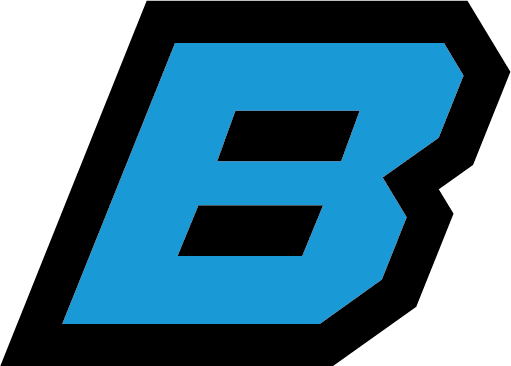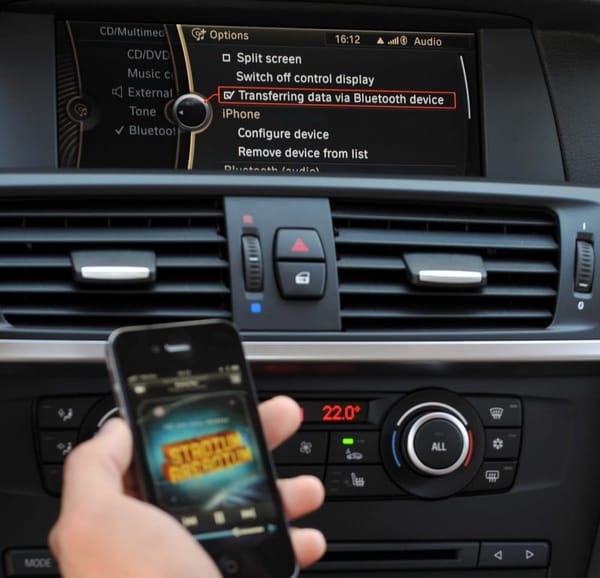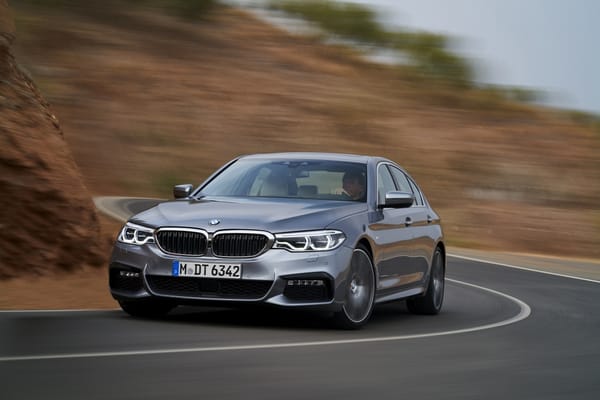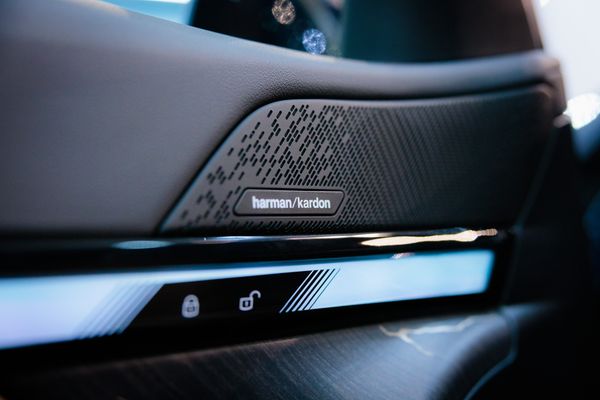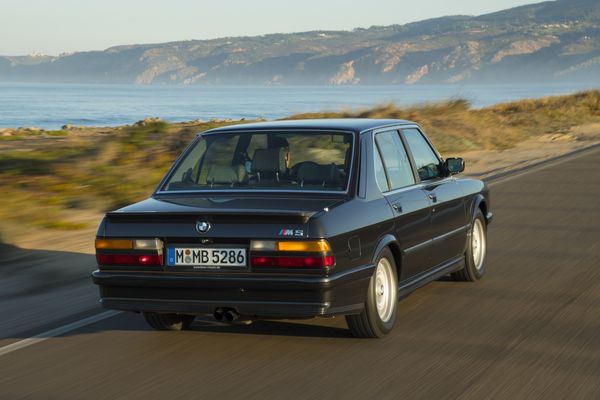Mastering BMW's ConnectedDrive: From Troubleshooting to 4G Upgrades
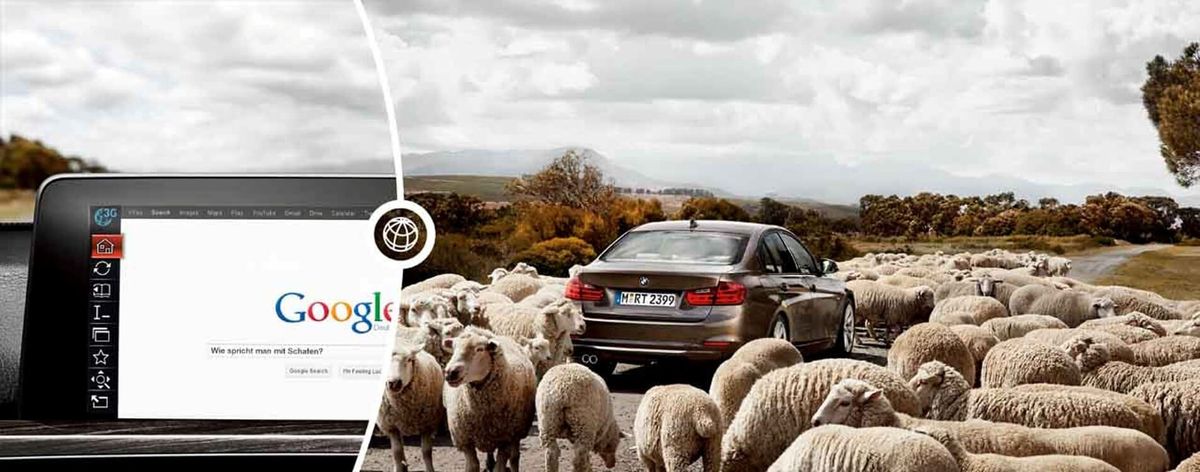
Ah, BMW. The Bavarian behemoth that has spent over a century perfecting the art of the "Ultimate Driving Machine" and then decided, "Hey, let's blend this with cutting-edge tech!" It's as if Beethoven decided to throw in some electric guitar into his Symphony No. 9.
Now, before you get all worked up – yes, it's a bizarre analogy, but stick with me here. BMW's ConnectedDrive is their latest orchestra of technology, and while it promises to connect us to our cars like never before, it does occasionally hit a flat note.

It's a system so intricate that when it works, you feel like you're driving in the future. But when it doesn't? It's like trying to tune a 90s TV with a broken remote – confusing, frustrating, and a reminder of how much we rely on tech. But fear not, intrepid BMW owner! This guide is your backstage pass to troubleshooting that electronic maestro, making sure every note, or rather, every feature plays harmoniously.
Buckle up (or should I say, tune up?), and let's dive into the symphony of solutions.
Understanding the BMW ConnectedDrive System
Before diving into the nitty-gritty of troubleshooting, let's take a moment to appreciate the genius behind the BMW ConnectedDrive System.
What is BMW ConnectedDrive and its Significance?
In its essence, the BMW ConnectedDrive is the brand's vision of a fully networked vehicle, seamlessly blending traditional driving pleasure with modern digital luxury. It's where the iconic spirit of BMW's driving dynamics meets the digital age, transforming your car from just a mode of transportation to a personalized digital companion on wheels.
A Journey Through the System's Symphony

- Vehicle: At the heart of it all is your BMW, meticulously engineered, combining decades of craftsmanship with state-of-the-art technology.
- iDrive with ConnectedDrive Service: Think of this as the conductor of the orchestra. The iDrive system is your main interface, allowing you to access and control a plethora of services and features tailored for an enhanced driving and user experience.
- Telematics Control Unit: The unsung hero of the system. This is the brain that communicates between the car and the outer world, ensuring everything runs smoothly and securely.
- GSM Antenna: Nestled discreetly as the shark fin on your car's roof, this antenna ensures your BMW is always connected, always online, no matter where the road takes you.
- Mobile Phone Connection: This serves as the bridge, ensuring real-time data transfer, making functionalities like live traffic updates and remote services possible.
- GSM Provider: Your car's telecom partner. It's what keeps your BMW online, ensuring constant communication between the vehicle and BMW's central IT infrastructure.
- Network Connection to the ConnectedDrive IT System: This is the highway of data transfer. It ensures that information from various services reaches your car promptly and securely.
- BMW ConnectedDrive IT System: The grand database. It stores, processes, and transmits essential service data, making sure you get accurate and timely information.
In essence, for the BMW ConnectedDrive to hit the right notes, several systems, both inside and outside the vehicle, must be in harmony. Each component relies on the other, much like instruments in an orchestra, creating a symphony of interconnected services that enhance your driving experience. It's not just about technology; it's about crafting an experience, a journey, and making every drive memorable.
Step-by-Step Troubleshooting Guide
In the vast world of BMW's ConnectedDrive, sometimes a string goes out of tune. But fear not! With the right steps, you can get your system back to sounding like the masterpiece it was designed to be.
Here's your guide to fine-tuning and troubleshooting:
1. Check the Telematics Function
- Why It's Vital: Think of the telematics as the lead violinist in your car's orchestra. When it's off, the entire symphony feels amiss.
- Testing the SOS Call System: Test out the SOS call feature. Both the ConnectedDrive and Emergency Call functionalities use this same system. If you get a 'SOS Call Malfunction' or a similar warning, it's time to investigate further.
- SOS Malfunction? Read the fault memory using ISTA or other compatible diagnostic tools. A common culprit can be a worn battery in the TCB/ATM telematics control unit, often located under the shark fin antenna.
2. Verify Your BMW's Reception
- Comparing Functionality: Park another BMW or MINI with a functioning ConnectedDrive system beside yours. Compare the functionality. It's like a duet, and you're checking if both are in harmony.
- Testing CD Services: Check out features such as SOS (Emergency Call), BMW Online, POI Search, and others. Remember, not all CD services will be available in every model, so ensure you're comparing apples to apples.
- Diagnosing Reception Issues: If the other car's CD works fine, you can likely rule out reception as the culprit. If not, reception may need a deeper look.
3. Update BMW Services
Updates can be the quick fixes that iron out those wrinkles, ensuring your ConnectedDrive system is running the latest and greatest.
- Via iDrive Menu: Head to the ConnectedDrive options menu and select "Update BMW Services." If it's grayed out, there's a hiccup in the system.
- Via ConnectedDrive Dealer Cockpit: The dealer or support team can often update services remotely. If they can't solve the issue from afar, a visit to the dealership might be on the cards.
- With ISTA Application: If you're a hands-on person and have access to ISTA, give it a shot. But remember, only the official online ISTA version will work for updating online services.
4. Reset the Telematics Control Unit
Sometimes, all a system needs is a good reboot. Think of this as a brief intermission to get things back on track.
- Rebooting the TCB or ATM: This often does the trick, especially if there aren't any error codes in the fault memory.
- Restarting the Telematics ECU: Disconnect the unit from its power supply for a good 20 minutes. This can be done by pulling the module's fuse or disconnecting the negative battery lead. The choice depends on the accessibility in your BMW model.
5. Contact ConnectedDrive Support
If you've gone solo and still can't hit the right notes, maybe it's time to call in the band.
- Reaching Out: Depending on your location, you can use the iDrive's Assist menu, the BMW Connected app, or the good ol' SOS button. Or, go analog with an email or phone call.
Useful Contact Links
Here are a few handy links to get you started:
6. Read The Fault Memory
Last, but not least, dive deep into the system's memory.
- Diagnostic Trouble Codes: Most faults in the ConnectedDrive system aren't stored as these codes. But if you do find a fault in the telematics system, a scanner can help you decode it and guide your next steps.
Remember, much like any musical piece, troubleshooting requires patience and precision. With these steps in hand, you'll have your ConnectedDrive system back to its harmonious best in no time!
Other Known ConnectedDrive Issues
Here are some issues that have made their curtain call in the ConnectedDrive theater:
ConnectedDrive Services Not Working
Ever felt like your state-of-the-art Bimmer suddenly decided to take a digital vacation?
You're not alone.
- Affected Models: This issue primarily plagues the BMW G-Series including F90 (M5), F91 (M8), and so forth, especially models produced up to December 2019.
- Symptoms: Certain BMW ConnectedDrive services seem to have taken an unannounced sabbatical. This can range from Concierge Service to Real-Time Traffic Information (RTTI) and even Weather updates.
- Culprit: A software gremlin lurking in the ATM2 telematics control unit is often to blame.
Remote 3D View Not Working
Imagine having the power to view your car in 3D remotely, and then – poof – it vanishes.
- Affected Models: This visual magic trick affects similar BMW models equipped with the 6AK (ConnectedDrive Services) and 5DN (Parking Assistance System Plus) options.
- Symptoms: The Remote 3D View decides to go AWOL in the BMW ConnectedDrive application.
- Culprit: Once again, the ATM2 software error is the party crasher.
ConnectedDrive Apps Misbehaving After Software Update
A classic case of "I updated and now it's broken!" syndrome.
- Affected Models: BMWs equipped with the 6U3 option, known as the BMW Live Cockpit Professional, are the main victims.
- Symptoms: After a software update, especially with the I-Level 20-03-xxx, ConnectedDrive Apps seem to play hide and seek in the iDrive system.
- Culprit: A software error, reminding us that even in the digital world, progress can sometimes be two steps forward and one step back.
The Fix: Often, the solution lies in updating the vehicle software and giving the CD services a good old-fashioned restart.
Remember, even the most complex symphonies can hit a discordant note.
But with awareness of these issues, you're well-equipped to fine-tune your BMW ConnectedDrive experience.
Stored Functional Restrictions (Fault Memory)
In the intricate ballet of ConnectedDrive's operations, sometimes a step is missed, a spin goes awry. But like any good choreographer, the system keeps a record, a memory if you will, of these missteps. Enter the domain of 'Stored Functional Restrictions' or what we tech aficionados fondly refer to as 'Fault Memory'.
Beyond the Vehicle's Dashboard
When we think of a vehicle's diagnosis, our minds often journey to the mechanical heart under the hood or the rubber meets the road. But in the interconnected world of ConnectedDrive, the diagnosis extends beyond the confines of the car.
Here, external systems, like IT infrastructures, play a pivotal role, connecting via a vast web of radio or mobile technologies that adhere to rigorous quality and safety standards.
The Imperative of Recording Errors
Imagine a maestro noting down every missed note during a rehearsal. That's what the fault memory does. It diligently records every hiccup, every glitch that occurs while setting up a connection or during the operation of ConnectedDrive services. And importantly, these aren't necessarily indicative of faults with the vehicle itself.
These fault code entries are akin to breadcrumbs, guiding the CD support team on a diagnostic journey, helping them understand the issues and elucidate them to users. The very concept of fault memory for functional restrictions was birthed from this need for a thorough diagnostic process.
Reading Between the Lines
When a ConnectedDrive service falters or only partially delivers, these errors find a home in the fault memory. Often, the root cause of such functional limitations lies outside the vehicle. For instance, if a mobile phone connection fails to establish, the system records this fault, along with the environment it occurred in.
The fault memory doesn't just record; it evaluates. It assesses conditions like mileage, time, and the cause of the fault. This data can then be dissected with a test module in the ISTA diagnosis system, presenting a clear picture of the problem and the recommended corrective action.
In essence, the 'Stored Functional Restrictions' is your BMW's way of saying, "I remember what went wrong, and here's how we can dance perfectly the next time."
It's about learning, adapting, and ensuring that every drive is as seamless as the one before.
ConnectedDrive Discontinuation for 3G
In the relentless march of technology, what's avant-garde today can become obsolete tomorrow. And in this digital tango, 3G took its final bow, leaving some BMW enthusiasts feeling a bit out of step.
The Sunset of 3G
Throughout 2022, mobile carriers orchestrated a global phase-out of 3G networks, making way for newer, faster, and more efficient technologies. But every innovation comes with its share of teething troubles. For BMW owners, the discontinuation felt like an unexpected intermission in an engrossing act.
BMW's Proactive Measures
Seeing the writing on the wall, BMW, ever the prudent maestro, began halting the renewal of ConnectedDrive contracts as early as 2021. The implication? Cars equipped with TCB-3G, COMBOX-NG, and ATM-3G telematics control units – primarily those hailing from the model year 2016 and before – would no longer enjoy the symphony of ConnectedDrive services.
The Affected Services
- Emergency Call (SOS/E-Call): Including automatic crash notification.
- BMW Online and eMobility
- MyInfo (sent to the car)
- Remote Services
- Stolen Vehicle Recovery
- TeleServices
- Real-Time Traffic Information (RTTI)
- My BMW App
For BMW owners with 3G telematics and valid contracts, this service would play its encore until the mobile carrier pulled the plug. Major carriers like AT&T, Verizon, and T-Mobile announced their curtain call dates for 3G, but remember, these dates were more of a guideline. Some carriers began dimming the 3G lights even sooner.
BMW's Encore: The 3G Sunset Campaign
But in true BMW fashion, the story didn't end with the 3G curtain call. BMW kickstarted a comprehensive "3G Sunset" campaign, aimed at retrofitting affected vehicles with the sleeker 4G technology.
Currently, this retrofit graces most of the BMW model range, from the 2 Series coupes and convertibles to the X Series SUVs.
BMW 4G Telematics Retrofit: The Details
For some BMWs, a mere software update was the remedy. However, most required both hardware and software overhauls. The silver lining? BMW classified this retrofit as a "repair retrofit."
This meant the maestro picked up the tab, covering the costs regardless of the vehicle's age or mileage. Curious if your BMW is set for this encore? A quick rendezvous with your BMW dealer will shed light on your car's retrofit eligibility and the roadmap ahead.
A word to the wise: ISTA, during this retrofit, will instinctively update all control units to their latest software versions. For those with modified or coded cars, this could strike a discordant note.
In essence, while 3G's swan song felt abrupt, BMW ensured the show went on, seamlessly transitioning to the 4G act, promising more riveting performances ahead.
BMW 4G Telematics Retrofit
As the automotive world hurtles towards a more connected future, ensuring your vehicle remains in tune with the latest technologies becomes paramount. BMW, in its commitment to driving excellence and cutting-edge technology, offers the 4G Telematics Retrofit. It's like giving your classic vinyl a remastered touch in the world of streaming.
The Whys and Hows
Why the Retrofit?
With 3G taking its final bow, ensuring your BMW remains a paragon of connectivity requires an upgrade to 4G. Not only does it promise faster and more reliable connections, but it also ensures your vehicle remains compatible with future updates and services.
Who's Eligible?
The majority of the BMW lineup can tap into this retrofit magic. From the elegant twirls of the 2 Series to the robust performance of the X Series, there's a good chance your BMW is on the list.
The Retrofit Process
- Software Update: Some vehicles might only require a software update, a quick tweak to get them humming along to the 4G tune.
- Hardware & Software Upgrade: For many, it's a two-step dance. This involves replacing the older 3G hardware with 4G components and then ensuring the software harmonizes perfectly with the new hardware.
- The Cost: Here's where BMW pulls a rabbit out of the hat. Classifying the retrofit as a "repair retrofit" means BMW foots the bill. Regardless of how many miles your vehicle has clocked or its age, this one-time 4G upgrade doesn't pinch your wallet.
Navigating the Retrofit
Reaching Out to Your Dealer:
To strike the right chord with this retrofit, start with a visit or call to your local BMW dealer. They'll be your guide, informing you about your car's eligibility and the steps involved.
A Heads-Up for Modified BMWs:
A word of caution for those who've added their personal touch to their BMWs. The ISTA system, during the retrofit, will instinctively bring all control units up to date with the latest software versions. If your car has been modified or coded in a specific way, this could reset some of those customizations.
In Conclusion
The BMW 4G Telematics Retrofit is more than just an upgrade; it's a commitment. A promise that, as the world changes, your BMW remains at the forefront, offering you the best in driving experience and connectivity.
So, while the tunes of technology rapidly evolve, your BMW remains timeless, always ready for the next track.
Conclusion
The crescendo of BMW's commitment to technological excellence is evident in the ConnectedDrive system. It's a symphony of innovation, where tradition and technology dance in perfect harmony.
As with any complex system, there might be occasional missteps or missed beats, but the beauty lies in the adaptability, resilience, and the drive (pun intended) to continuously evolve.
From understanding the intricate layers of the ConnectedDrive to troubleshooting its quirks, we've journeyed through the challenges posed by the obsolescence of 3G and celebrated the solutions presented by the 4G Telematics Retrofit.
The journey underscores BMW's unwavering commitment to its drivers, ensuring that every drive is not just about reaching a destination, but about cherishing the experience.
As we steer into the future, one thing remains clear: BMW is not just about crafting vehicles; it's about crafting experiences, memories, and journeys.
Whether you're a long-time BMW aficionado or a newcomer to the brand, the promise remains the same – a drive that's unparalleled, a connection that's unbroken, and a future that's undeniably exciting.
So, as you ignite your BMW's engine and the notes of its roar fill the air, remember that with every drive, you're not just part of a legacy, but a vision of the future.
Happy driving!


